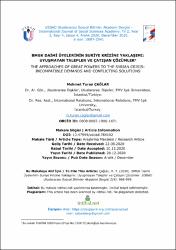| dc.contributor.author | Turan, Mehmet Çağlar | en_US |
| dc.date.accessioned | 2022-10-20T15:31:37Z | |
| dc.date.available | 2022-10-20T15:31:37Z | |
| dc.date.issued | 2020-12-22 | |
| dc.identifier.citation | Çağlar. M. T. (2020). BMGK daimi üyelerinin Suriye krizine yaklaşımı: uyuşmayan talepler ve çatışan çözümler. Uluslararası Sosyal Bilimler Akademi Dergisi, 4, 968-999. doi:10.47994/usbad.784102 | en_US |
| dc.identifier.issn | 2687-2641 | en_US |
| dc.identifier.uri | https://hdl.handle.net/11729/5052 | |
| dc.identifier.uri | http://dx.doi.org/10.47994/usbad.784102 | |
| dc.description.abstract | Mart 2011’de ülke içerisinde gösterilerle başlayan Suriye krizi, BMGK’nın daimi üyelerinin krize yaklaşımından etkilenmiştir. BM’de veto yetkisine sahip bu devletler, krize kısa zaman içerisinde müdahil olmuş fakat bu aktörlerin farklı hedefleri, krizin çözümünü engellerken hayata geçirdikleri önlemler, birbirlerini etkisizleştirmiştir. Ayrıca tarafların yaklaşımları doğrultusunda devreye soktuğu önlemler, BMGK’nın etkinliğini sınırlandırmıştır. ABD, İngiltere ve Fransa, Suriye krizinin kaynağını Suriye yönetiminin yöntemleri olarak görmüş ve krizin çözümünü Suriye’de yönetimin değişmesi olarak belirlemiştir. Diğer taraftan Rusya ve Çin, krizin kaynağını Suriye yönetiminin yanında ülke içinde şiddet uygulayan diğer aktörler olarak görmüş ve dışarıdan herhangi bir müdahaleye karşı çıkmıştır. Daimi üyelerin krize yaklaşımları taraflar arası bir denge oluştursa da zaman içerisinde ABD, İngiltere ve Fransa'nın kriz bağlamında önceliklerinin değişmesi, Rusya’nın Suriye iç savaşına katılması ve BMGK’nın Rusya ve Çin’in siyasal çözüm önerilerini desteklemesiyle birlikte Suriye krizinin tarafları arasındaki denge bozulmuş ve Çin ve Rusya’nın krize yaklaşımları ön plana çıkmıştır. Bu bağlamda bu çalışmayla BMGK’nın daimi üyelerinin Suriye krizine etkilerinin neler olduğu gösterilecektir. Ayrıca çalışmada bu aktörlerin hangi stratejileri devreye soktuğu ve bu stratejilerin küresel örgüt üzerindeki etkileri analiz edilecektir. Bu analiz için daimi üyelerin açıklamaları ve hayata geçirdiği siyasalar gösterilip BMGK’da Suriye kriziyle ilgili alınan kararlar ve bu kararların krize etkileri incelenecektir. | en_US |
| dc.description.abstract | The Syrian crisis, which started in March 2011 with massdemonstrations, has been affected by the conflicting approaches of thepermanent members of the UNSC. The UNSC veto powers have intervened inthe crisis in a short time, but their different objectives have prevented anylong-term solutions, and their measures have neutralized the others’measures. Furthermore, conflicting demands of the parties have limited theeffectiveness of the UNSC. The USA, France, and the UK considered thesource of the Syrian crisis as the policies of the Syrian administration, andthey determined the solution as the change of the Syrian administration. Onthe other hand, Russia and China have seen the source of the crisis as theviolence of other actors besides the Syrian administration’s policies andopposed any foreign intervention in the crisis. Although the permanentmembers’ conflicting approaches have created a kind of balance between theparties, China and Russia's approaches to the crisis has begun to come to thefore after Russia’s direct intervention in the Syrian civil war, the change inthe priorities of the USA, Britain, and France in the context of the crisis, andthe support of the UNSC to Russia and China’s initiatives in terms of a politicalsolution. In this context, this article will show the effects of the UNSC vetopowers on the Syrian crisis. Moreover, their strategies about the crisis andthe effects of these strategies on the global organization will be analyzed. Forthis analysis, the permanent members’ declarations and implemented policiesduring the Syrian crisis, and the effects of UNSC resolutions on the crisis willbe examined. | en_US |
| dc.language.iso | tr | en_US |
| dc.publisher | Salim Durukoğlu | en_US |
| dc.relation.ispartof | Uluslararası Sosyal Bilimler Akademi Dergisi | en_US |
| dc.rights | info:eu-repo/semantics/openAccess | en_US |
| dc.subject | Suriye krizi | en_US |
| dc.subject | Uluslararası kriz | en_US |
| dc.subject | Birleşmiş Milletler Güvenlik Konseyi | en_US |
| dc.subject | ABD | en_US |
| dc.subject | Rusya Federasyonu | en_US |
| dc.subject | Syrian crisis | en_US |
| dc.subject | International crisis | en_US |
| dc.subject | United Nations Security Council | en_US |
| dc.subject | USA | en_US |
| dc.subject | Russian Federation | en_US |
| dc.title | BMGK daimi üyelerinin Suriye krizine yaklaşımı: uyuşmayan talepler ve çatışan çözümler | en_US |
| dc.title.alternative | The approaches of great powers to the Syrian crisis: incompatible demands and conflicting solutions | en_US |
| dc.type | Article | en_US |
| dc.description.version | Publisher's Version | en_US |
| dc.department | Işık Üniversitesi, İktisadi ve İdari Bilimler Fakültesi, Uluslararası İlişkiler Bölümü | en_US |
| dc.department | Işık University, Faculty of Economics and Administrative Sciences, Department of International Relations | en_US |
| dc.authorid | 0000-0003-1906-1471 | |
| dc.authorid | 0000-0003-1906-1471 | en_US |
| dc.identifier.issue | 4 | |
| dc.identifier.startpage | 968 | |
| dc.identifier.endpage | 999 | |
| dc.peerreviewed | Yes | en_US |
| dc.publicationstatus | Published | en_US |
| dc.relation.publicationcategory | Makale - Ulusal Hakemli Dergi - Kurum Öğretim Elemanı | en_US |
| dc.institutionauthor | Turan, Mehmet Çağlar | en_US |


















